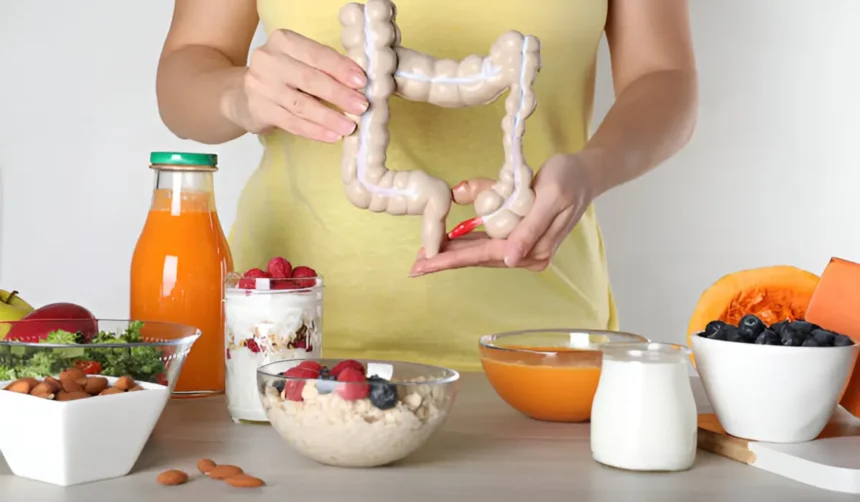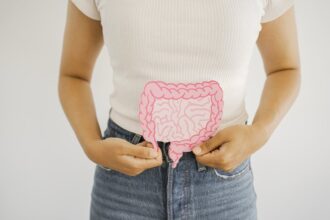Good gut health is the foundation of a strong body and mind. In the United States, poor digestion has become more common because of fast food, stress, processed snacks, and irregular eating habits. The good news is that you can improve your gut health naturally by making simple diet-based changes at home. These changes are affordable, safe, and easy to follow for beginners.
If you want more helpful health guides, you can also explore related wellness articles on HealthGuiders.com to continue your healthy journey.
Why Gut Health Matters for Overall Well-being
Your gut is home to trillions of tiny bacteria called the gut microbiome. These friendly bacteria help digest food, absorb nutrients, boost immunity, and even support your mental health. When your gut is balanced, you feel energetic, lighter, and mentally sharp. But when it is not balanced, you may notice gas, bloating, constipation, low immunity, skin issues, and even anxiety.
Understanding gut health is not complicated. It simply means keeping your digestive system happy by eating the right foods and avoiding the ones that irritate your stomach.
Signs Your Gut Needs Support
Your body gives clear signals when your gut health is weak. Many Americans experience these signs but often ignore them:
Frequent bloating after meals
Constipation or loose stools
Low energy even after sleeping well
Food intolerances
Bad breath
Skin breakouts
Feeling anxious or stressed often
If you notice these symptoms regularly, strengthening your gut naturally through food-based changes can help you feel better within a few weeks.
Best Natural Ways to Improve Gut Health Through a US-Friendly Diet
Improving your gut health naturally does not require expensive supplements. Simple grocery store foods like yogurt, fruits, vegetables, and whole grains can make a big difference.
Below are the most effective diet-based solutions used by nutritionists, backed by science, and easy for anyone in the US to follow.
Add More Probiotics to Your Daily Diet
Probiotics are live good bacteria that support digestion. They help balance the gut and reduce bloating, constipation, and inflammation. You can include probiotics through common American grocery items like:
Yogurt with active cultures
Kefir
Sauerkraut
Pickles
Kimchi
Kombucha
Miso
Try to include at least one probiotic-rich food every day. If you are new to probiotics, start slow and increase gradually to avoid temporary gas.
Increase Prebiotic Foods for Healthy Digestion
Prebiotics are the food that feeds the good bacteria in your gut. Think of prebiotics as fuel for a strong digestive system. Many US-based foods naturally contain prebiotics, such as:
Garlic
Onions
Bananas
Oats
Asparagus
Apples
Sweet potatoes
Eating more prebiotic-rich foods helps your gut bacteria grow, which improves digestion and immunity.
Choose Fiber-Rich Foods to Fix Constipation
Fiber is one of the easiest and cheapest ways to improve digestive health. It helps regulate bowel movements, reduces constipation, and keeps your gut bacteria healthy.
Examples of fiber-rich foods easily available in US stores include:
Whole grains
Black beans
Lentils
Chia seeds
Broccoli
Carrots
Berries
Try to eat both soluble fiber (like oatmeal, apples) and insoluble fiber (like whole wheat bread, brown rice) for the best gut support.
Drink Plenty of Water to Support Gut Movement
Dehydration is one of the main reasons for constipation in the US. Water helps break down food, move fiber through the intestines, and prevent digestive discomfort. Drinking 6–8 cups of water daily is a simple and effective habit for gut health.
If you find plain water boring, try infused water with lemon, cucumber, or mint for better taste and extra hydration.
Reduce Processed Foods and Sugary Snacks
Packaged snacks, processed foods, and sugary drinks weaken the gut microbiome. Soda, chips, pastries, and fast food feed bad bacteria, leading to bloating and inflammation.
You don’t need to quit everything at once. Start by reducing them slowly. Swap soda for flavored sparkling water, choose fresh fruit instead of candy, and replace fried snacks with baked options.
Add Fermented Foods to Improve Good Bacteria
Fermented foods are a natural source of probiotics and enzymes that support digestion. If you regularly eat yogurt, sauerkraut, pickled vegetables, and miso soup, your gut becomes stronger over time. These foods are also widely available in American supermarkets like Walmart, Kroger, and Whole Foods.
Eat More Anti-Inflammatory Foods for Gut Repair
The gut lining needs soothing foods to heal. Adding anti-inflammatory ingredients helps reduce irritation and supports long-term gut balance.
Some US-friendly anti-inflammatory foods include:
Leafy greens
Salmon
Turmeric
Ginger
Olive oil
Blueberries
Walnuts
Including these foods daily can improve digestion, reduce bloating, and support overall health.
Limit Alcohol and Reduce High-Caffeine Drinks
Alcohol and excess caffeine irritate the stomach and disturb digestion. If you experience heartburn or poor sleep after drinking alcohol or coffee, try reducing your intake. Replace coffee with herbal teas like chamomile, peppermint, or ginger to soothe your stomach naturally.
Practice Slower Eating and Chew Food Properly
One of the most underrated gut-health habits is slow eating. When you chew properly, your stomach can digest food more easily. Eating too fast often leads to gas, bloating, and stomach pain.
Try to sit down, avoid screens, and enjoy your meals mindfully. Even these small changes can improve digestion naturally.
Try a Consistent Eating Schedule
Irregular eating confuses your digestive system. Many Americans skip breakfast, eat a heavy lunch, and snack late at night, which weakens gut balance. A simple routine like three main meals and two light snacks can help your gut work smoothly.
Consider an Elimination Diet if You Have Food Sensitivity
Some people feel better after avoiding foods that trigger irritation, such as dairy, gluten, or spicy foods. If you notice discomfort after certain meals, try removing that food for two weeks and see how your body reacts. If you want a detailed elimination diet guide, you can explore more related nutrition tips on HealthGuiders.com.
When to Seek Professional Help
If your gut problems continue even after making diet changes, it may be best to speak with a doctor. Conditions like IBS, GERD, or gut infections may need medical support. Natural methods help a lot, but understanding your body’s signals is equally important.
FAQs About Improving Gut Health Naturally
What is the fastest way to improve gut health?
Eating probiotic and prebiotic foods daily, drinking more water, and reducing processed foods can improve gut health within a few weeks.
How do I know if my gut is unhealthy?
Common signs include bloating, constipation, food intolerance, acne, low energy, and frequent stomach discomfort.
Can I improve gut health without supplements?
Yes. Natural foods like yogurt, bananas, oats, vegetables, fruits, and fermented foods are enough to improve gut health naturally.
How long does it take to heal the gut?
Most people feel improvements in 2–4 weeks with consistent diet changes.
Does drinking warm water help digestion?
Yes, warm water supports smoother digestion and reduces constipation.
Final Thoughts
Improving your gut health naturally is simple, affordable, and effective. With small diet-based adjustments, you can reduce bloating, increase energy, improve mood, and strengthen immunity. Focus on probiotic foods, fiber-rich meals, hydration, and gentle anti-inflammatory ingredients. Over time, your digestive system becomes healthier and more balanced.
For more detailed wellness guides, recipes, and nutrition tips, visit HealthGuiders.com and stay updated with the latest healthy-living articles.




